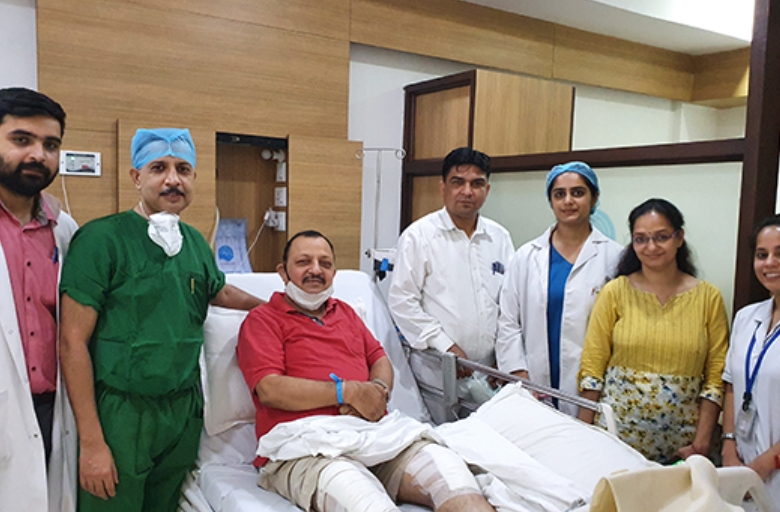


Orthopaedic surgery has substantially evolved over the years, bringing comfort and greater usefulness to numerous patients suffering from orthopaedic conditions.
However, the success rate of various surgical treatments varies depending on choosing the Best Knee Replacement Doctor and variety of circumstances.
Pre-operative Health Condition: The overall health condition of the patient prior to surgery plays a pivotal role in determining the success rate. Patients with pre-existing medical conditions such as diabetes, obesity, or cardiovascular issues may have a higher risk of complications during and after surgery. Optimizing the patient’s health before the procedure through proper medical management can enhance surgical outcomes.
Skill and Experience of the Surgeon: The expertise and experience of the Orthopaedic Surgeon In Delhi are paramount. Surgeons with extensive experience and proficiency in the specific procedure are more likely to achieve favorable outcomes. Their ability to navigate complexities, make informed decisions during surgery, and manage unexpected challenges greatly influences the success rate.
Surgical Technique and Technology: Advancements in surgical techniques and technology have revolutionized orthopaedic procedures, enabling more precise interventions with reduced trauma to surrounding tissues. Minimally invasive techniques, computer-assisted navigation, and robotic surgery have improved accuracy and outcomes while minimizing recovery times and complications.
Patient Compliance and Rehabilitation: Patient compliance with pre-operative preparations, post-operative care, and rehabilitation protocols significantly impacts the success of orthopaedic surgery. Following the surgeon’s instructions regarding physical therapy, activity modification, and lifestyle changes is crucial for optimal recovery and long-term outcomes.
Quality of Implants and Materials Used: The choice of implants and materials used during surgery can affect the longevity and functionality of the repaired or replaced joint. High-quality implants that are biocompatible and durable contribute to better outcomes, reducing the risk of implant failure, instability, or adverse reactions.
Post-operative Complications Management: Prompt identification and management of post-operative complications such as infections, blood clots, or implant-related issues are vital for ensuring successful outcomes. Close monitoring during the recovery period and timely intervention can prevent complications from escalating and impacting the overall success of the surgery.
Patient Factors: Individual patient factors such as age, lifestyle, smoking status, and adherence to rehabilitation play a role in determining surgical success. Younger, healthier patients with realistic expectations and a positive attitude toward recovery tend to fare better post-surgery.
Underlying Pathology and Severity of Condition: The nature and severity of the underlying orthopaedic condition being treated also influence the success rate. Conditions with complex pathologies or advanced stages may pose greater challenges and have a higher risk of complications.
When going for orthopaedic surgery, age is an important factor to consider. When determining how age influences the choice to have orthopaedic surgery, several aspects must be considered. Know from Dr. Shekhar Srivastav the best Orthopaedic Surgeon In Delhi about the different factors.
Health status:
One of the concerns is the patient’s general health state, which might vary with age. Younger people tend to have fewer pre-existing health issues and may be better candidates for surgery.
They frequently have higher bone density and muscular strength, which aids in postoperative recuperation. Conversely, older adults may have comorbidities such as diabetes, heart disease, or respiratory issues, which can increase the risks associated with surgery and anesthesia.
Bone Quality and Healing Capacity:
Age-related changes in bone quality and healing capacity can influence the success of orthopedic surgeries. Younger individuals tend to have denser bones and more robust healing mechanisms, making them better suited for procedures like fracture repair or joint reconstruction. Older adults may experience slower healing times and diminished bone density, which can increase the risk of complications such as non-union or implant failure.
Lifestyle and Activity Level:
Age often correlates with lifestyle and activity level, which can impact the need for orthopedic surgery. Younger, more active individuals may be motivated to undergo surgery to maintain their quality of life and continue participating in sports or physical activities.
On the other hand, older adults may be more willing to tolerate pain or functional limitations, particularly if they have a sedentary lifestyle or lower activity requirements.
Long-Term Goals and Expectations:
Age can influence a patient’s long-term goals and expectations regarding surgery outcomes. Younger patients may prioritize returning to work or sports and expect a higher level of function post-surgery. In contrast, older adults may focus more on pain relief and maintaining independence in daily activities. These differing priorities can influence the decision-making process and the choice of surgical interventions.
Risk Tolerance:
Age often affects an individual’s risk tolerance, which can influence their willingness to undergo surgery. Younger patients may be more willing to accept the risks associated with surgery in exchange for the potential benefits.
Whereas older adults may be more risk-averse and prefer conservative treatment options. Older adults may consider factors such as postoperative rehabilitation and recovery time when weighing the risks and benefits of surgery.
A variety of factors influence the success rate of orthopedic surgery, including patient factors, surgical expertise, technological advancements, and post-operative care. Dr. Shekhar Srivastav the best Orthopaedic Doctor In Delhi aim to optimize results and enhance patient’s quality of life by addressing these issues holistically and using different approach.